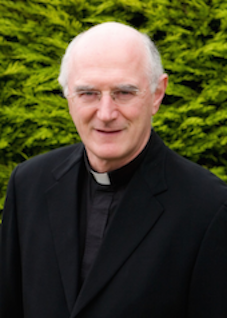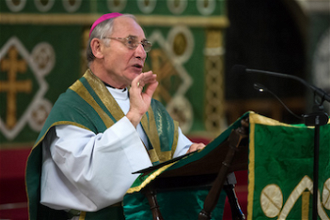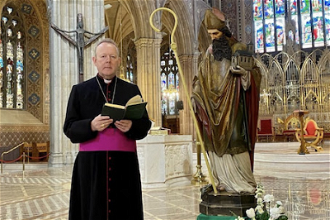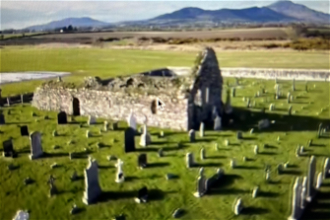Dublin: Archbishop's homily for St Patrick's Day

Archbishop Dermot Farrell
Source: Irish Catholic Media Office
"Our land - and indeed our faith - have never been some idealised monocultural fortress … lies that seek to stoke division by exploiting grievances are a denial of the generosity of Christ"
"Do we not, as people of faith, have a responsibility to encourage our politicians and civic leaders to go further and do better, to deliver the infrastructure of services which all in our communities so urgently require?"
Homily for Saint Patrick's Day
We gather to give thanks to God for the gift of Patrick, whose preaching and ministry planted a seed that grew in the hearts of successive generations of Irish people, down to our own day. Patrick offered himself as a willing instrument of the Lord, proclaiming God's love and mercy, and devoting his life to proclaiming the freedom that the gospel brings, and nurturing the faith of the communities that welcomed it.
With Saint Paul, Patrick could rightly proclaim that he had fought the good fight to the end, had run the race to the finish and above all, had kept the faith (see 2 Tim 4:7-8). Patrick, very clear that the success of his mission was not due to his own merits or effort, tells us that it was the gift of Christ that he should spend his life serving the people in truth and with humility to the end. His Confession, written before he died, affirmed that whatever little he did, or made known, to please God was itself a gift of God. He saw himself as "a letter of Christ" (Confession 11). Again, like Paul, he calls himself an ambassador for Christ (Confession, 56; Letter to Coroticus, 5).
The witness of Patrick and his followers to Christ, and their rootedness in what could be termed Saint Paul's missionary spirituality, gave the Church in Ireland its particularly distinctive missionary character through the centuries. It was this passion for Christ and for those who did not yet know him, that led Irish monks in early centuries to bring their faith, and its light and hope to communities across Europe. In other ways in the last two centuries, this same inspiration found further expression in the lives and dedication of countless of Irish women and men who left this island to make a new home among communities across the globe. Their lives too were poured out as a libation and many endured much hardship and suffering, even martyrdom, in the service of the gospel.
There is one aspect of Patrick that merits particular attention today. Patrick's arrival as aspal Éireann as the hymn calls him - was not his first encounter with our land. His first visit was not of his own volition: he was taken prisoner as a youth, and was trafficked to a strange land and a strange people who exploited him for his labour. While he managed to escape, he surprisingly felt called to return to preach to those among whom he had been held captive. This is the measure of the man, and of his faith. Regrettably, human trafficking and the exploitation of the vulnerable are still markers of our own time.
From ancient times, we in Ireland have experienced the effects of migration and displacement. Our very DNA witnesses to a story of waves of people who settled here and shaped our culture, traditions and history. Sometimes, new arrivals evoked fear and conflict through the displacement imposed by those who would colonise this island. That fear wove its own survival narrative, a narrative all too often written at the cost of the outsider and the stranger, and resistant to the enriching effect of the different strands of human experience, and indeed different ways of expressing the human experience of God and of the gospel. The passing of time permits us to look back and appreciate that Ireland today is a rich tapestry of many traditions and peoples. The Ireland that is given to us is an Ireland that continues to be woven. Our land is not - and indeed our faith - have never been some idealised monocultural fortress. But that is a truth that takes us all a long time to learn.
It is only in recent decades that we have returned to perceiving migration as welcoming of the stranger. Here, we owe much to historians - national, international, and local - who have permitted us to hear anew voices silenced in times which afforded little space to difference or otherness. For over 150 years, post-Famine Ireland haemorrhaged people, driven from home by hunger and the absence of opportunity. Most emigrated to seek a better future as economic migrants, seeking opportunity among strangers. They brought with them a hope, and an eagerness to work and build a future that their home place could not provide. They depended on the kindness of strangers to receive and welcome them, and give them an opportunity to contribute to the building up of their new homes. Across the English-speaking world, and indeed elsewhere, they travelled with a dream of returning, but no realistic expectation that they would. Their going was a silent grief borne by their families. While their lives abroad often did fulfil their hopes, for many emigration brought hardship and disappointment.
Often - but not always - they carried their faith, handing it on to new generations. That faith was nurtured by generous waves of Irish priests and religious who ministered among their own in the places to which the Irish had travelled. Their work built up local churches, in places as different as Boston and Buenos Aires, often honouring Saint Patrick as the patron of the gift of the faith they had received. We remember this morning the late Bishop David O'Connell, a native of Cork, tragically killed in Los Angeles. David's prophetic ministry struck a chord, not only with those of Irish descent, but also the many thousands of Hispanic heritage whose immigrant experience paralleled that of the Irish.
It behoves us then not to forget the Irish emigration story when we consider how to welcome the many thousands who have recently come to seek opportunity and refuge in our midst. More than one in six of those living in the diocese of Dublin were born outside Ireland. That is an astounding statistic. In a relatively short period they have brought their gifts and talents as they make their homes here, working in our health services, in our new technology sector, our service industries, as well as in the professions and trades. Just like the Irish abroad, they have brought their expertise and hard work, and many are key members of our communities. Their presence in our parishes brings new life. We are blessed to have the ministry of the many women and men who minister among their countrymen and women, just as the Irish did in the past, and many more whose ministry in the churches of this island echoes that of Patrick himself.
The immigrant path is not an easy one. Sadly, there are those who seek to stir up hostility and more against those who have come to our shores. It is nothing more than a lie that some have claimed that they are motivated by a desire to defend our Christian heritage. Apart from the fact that many of those who have made their homes among us profess and practice a deep Christian faith, exclusion of the stranger is a denial of a central value of Jewish and Christian faith. Not only does God reveal Himself as being especially close to those to the stranger, but God reveals His very nature in the life of those who wander, and in the welcome shown to the unexpected stranger. God called Abraham, our father in faith, to wander, and he was constantly challenged by God to welcome those who found themselves where he had been (see Genesis 12:1-4; 18:2). Exile and return are key markers of the story of our salvation. Jesus entered the world as a part of a family forced, by an imperial imperative, to go Bethlehem. Like his forebears, he and his family had to flee to Egypt (see Matt 2:13-15): today we would call them migrants and refugees. In his teaching Jesus developed the biblical tradition of welcome for the stranger. He tells His followers that we face judgement on whether we welcomed Him, or failed to make Him welcome, when we encountered Him as a stranger (Matt 25:31ff). The stranger is not to be feared or shunned: Jesus' encounter with the Samaritan woman (John 4:5-42), that we read this past Sunday, shows the inclusiveness of the Lord's care and concern. The incomparable story of the Good Samaritan brings out how the compassion of God's kingdom are to be found in the heart that sees first of all the need of the stranger no matter who they are (see Luke 10:25-37). Of course, it was the stranger - an outsider - who put flesh on that Divine compassion: what the surprise that Jesus sprung on His hearers!
In the struggle to build a just and sustainable society - here in Dublin as much as around the world - there are, in the words of Pope Francis, only two kinds of people: those who care for someone who is suffering and those who pass by (see Fratelli Tutti, 63ff). Passing by in this case includes turning a blind eye to discrimination and letting go unchallenged those determined to spread fear and hatred through lies and distortion. We may never allow the language of hate to become normalised or acceptable - the labelling of individuals and communities with stereotypes that dehumanise and alienate is the very opposite of the good news we carry; the lies that seek to stoke division by exploiting grievances are a denial of the generosity of Christ, and the goodness of God.
This is not to deny that there are challenges to be faced. Rapid population growth and past policy choices have put extreme pressure on housing and other vital services. Our way of organising things can make it difficult to move quickly to avert a crisis. There are those who have long waited for their needs to be met and they have real concerns that they may lose out further as others come to live in this society. But we are a generous country. We are a people who can rise to the challenge of welcome. It comes at a cost; we know this. Our welcome is generous and genuine: is fíor an fáilte a cuirimíd roimh an comharsa - true welcome is much more than an advertising slogan, it is putting flesh on the welcome of Christ. The response to the plight of those driven from their homes by the vicious violence visited upon Ukraine has been a demonstration of heartfelt solidarity. Parishes and communities have also organised themselves over recent years to offer a real welcome to those who have fled persecution, war and natural disasters in their home countries to seek refuge here.
The Christian community is called to encourage those better reflexes that reflect the Irish tradition of welcome to the stranger, just as the children of this land for generations hoped for a similar welcome in their day. Do we not, as people of faith, have a responsibility to encourage our politicians and civic leaders to go further and do better, to deliver the infrastructure of services which all in our communities so urgently require? It is incumbent upon us to encourage policies that address the root causes of much of the global migration that unfolds before our eyes. Unfair economic strategies and the unsustainable exploitation of our planet are producing pressures that have driven and continue to drive millions from their homes. Here, I wish to acknowledge the message of President Higgins for Saint Patrick's Day. Its welcome analysis merits careful listening and considered reception. Just like the Great Famine, the roots of the crisis are economic and ethical, not biological. In the same way, the response - our response - must be ethically rooted, rooted in relationships, not just technology. Of course, science is vital, as was driven home during the pandemic, but what drives the science? Must it not be our care not just for ourselves, but for our neighbour?
Ireland has been a major beneficiary of the globalised economy; we must ensure that we are not contributing to what Pope Francis has called the globalisation of indifference, by which he means the callousness with which individuals and communities treat persons on the peripheries (Homily in Lampedusa, 8 July 2013).
Patrick preached the love of God and neighbour expressed in the life, death and resurrection of Jesus. We cannot profess love of God and love of neighbour without acting to give it concrete expression. When God knocks at the door in the form of the migrant dependent on our kindness, there can be no ambiguity about how we need to respond: welcoming the stranger is not only our solemn duty and noble tradition, it is God's call to discover our true selves.
Pádraig, Aspal Éireann: guí orainn. Amen.
Archbishop Dermot Farrell is Archbishop of Dublin. This homily was delivered during Saint Patrick's Day's Mass, at 10.30am, in Saint Mary's Pro-Cathedral, Archdiocese of Dublin


















